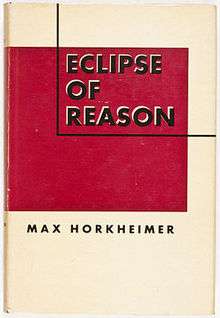Eclipse of Reason (Horkheimer)
 First edition | |
| Author | Max Horkheimer |
|---|---|
| Published | 1947 Oxford University Press |
| Media type | |
Eclipse of Reason is a book published in 1947, by Max Horkheimer. The author discusses how the Nazis were able to project their agenda as "reasonable",[1][2] but also identifies the Pragmatism of John Dewey as problematic, due to his emphasis on the instrumental dimension of reasoning.
It is broken into five sections: Means and Ends, Conflicting Panaceas, The Revolt of Nature, The Rise and Decline of the Individual and On the Concept of Philosophy [3] and deals with the concept of reason within the history of western philosophy.[4] Horkheimer defines true reason as rationality,[4] which can only be fostered in an environment of free, critical thinking. He details the difference between objective, subjective and instrumental reason, and states that we have moved from the former through the center and into the latter (though subjective and instrumental reason are closely connected). Objective reason deals with universal truths that dictate that an action is either right or wrong. It is a concrete concept, and a force in the world that requires specific modes of behavior. The focus in the objective faculty of reason is on the ends, rather than the means. Subjective reason is an abstract concept of reason, and focuses primarily on means. Specifically, the reasonable nature of the purpose of action is irrelevant - the ends only serve the purpose of the subject (generally self-advancement or preservation). To be "reasonable" in this context is to be suited to a particular purpose, to be "good for something else". This aspect of reason is universally conforming, and easily furnishes ideology. In instrumental reason, the sole criterion of reason is its operational value or purposefulness, and with this, the idea of truth becomes contingent on mere subjective preference (hence the relation with subjective reason). Because subjective/instrumental reason rules, the ideals of a society, for example democratic ideals, become dependent on the "interests" of the people instead of being dependent on objective truths. Nevertheless, Horkheimer admits that objective reason has its roots in Reason ("Logos" in Greek) of the subject. He concludes,
If by enlightenment and intellectual progress we mean the freeing of man from superstitious belief in evil forces, in demons and fairies, in blind fate - in short, the emancipation from fear - then denunciation of what is currently called reason is the greatest service we can render.[5][6]
Bibliography
- Eclipse of Reason. Oxford University Press. 1947.; reprint Continuum International Publishing Group, 2004, ISBN 978-0-8264-7793-4
References
- ↑ http://filer.case.edu/ngb2/Authors/Horkheimer.html
- ↑ "Literary Encyclopedia | Eclipse of Reason". litencyc.com. Retrieved 2015-05-14.
- ↑ "Horkheimer, Max" Dictionary of the Social Sciences. Craig Calhoun, ed. Oxford University Press 2002. Oxford Reference Online. Oxford University Press. College of the Holy Cross. 14 October 2009 <http://www.oxfordreference.com/views/ENTRY.html?subview=Main&entry=t104.e767>
- 1 2 "Home - Filer". filer.case.edu. Retrieved 2015-05-14.
- ↑ Eclipse of Reason, Seabury Press, 1974 (Originally 1941). P. 187
- ↑ https://books.google.com/books?hl=en&lr=&id=nuzj9LLrKlgC&oi=fnd&pg=PA3&dq=max+horkheimer&ots=ws_ZkIucn4&sig=DQByD8cMAjrJWwgJQD6Iowvqgv0#v=onepage&q=&f=false
